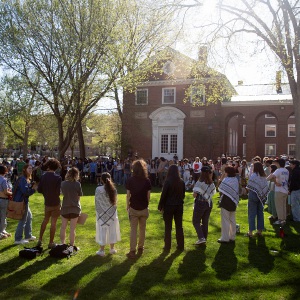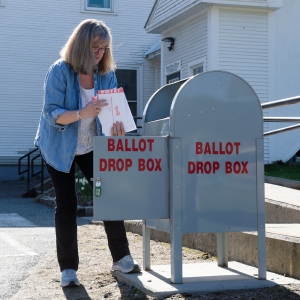Upper Valley Republicans contemplate Tuesday’s primary
|
Published: 01-19-2024 9:00 PM
Modified: 01-22-2024 9:25 AM |
LEBANON — In the lead-up to the New Hampshire primary, Nikki Haley, former governor of South Carolina and candidate for the 2024 Republican presidential nomination, has been crisscrossing the state from Hollis to Keene to Exeter to Franklin to try to increase her chances of winning on Tuesday.
Her trips around the state come after finishing third in this week’s Iowa caucuses, behind first-place ex-President Donald Trump and second-place Florida Gov. Ron DeSantis.
To secure a victory in New Hampshire, Haley — who has been endorsed by Gov. Chris Sununu — will need the support of a voter like Colin Fay, an Enfield resident who describes himself as undeclared. Fay, who was on his way to the Lebanon Post Office near Colburn Park when questioned, plans to vote for Haley because, he said, “she has the best chance of beating (Trump).”
Just how good a “chance” depends on who you ask and when you ask them.
The New Hampshire electorate is famously ornery and in previous presidential primaries has elevated candidates who do not make it through to the general election. Undeclared voters such as Fay can choose which party’s primary they want to vote in at the polls on Tuesday, which gives independent-minded voters the ability to impact results.
And then there is the loyalty of President Trump’s base, who perceive him to be the victim of a judicial and political witch hunt.
“There is a disconnect between the media perception of his base and the reality. The media presents Trump’s supporters as fringe and much smaller than they actually are,” said Sean Westwood, a professor of government at Dartmouth College.
According to a Jan. 16 poll by the Saint Anselm College Institute of New Hampshire Politics, former President Donald Trump dominates the field in the New Hampshire primary, with 52% of likely New Hampshire Republican voters backing him. Haley placed second at 38%, and DeSantis is in third, with 6% of voters. Since Trump’s first-place finish in the Iowa caucuses on Jan. 15, his lead in New Hampshire increased 7 points, according to the Saint Anselm poll. Despite his second-place finish in Iowa, Desantis last week all but abandoned campaigning in New Hampshire, ceding the race to his two rivals.
Article continues after...
Yesterday's Most Read Articles
 Dartmouth administration faces fierce criticism over protest arrests
Dartmouth administration faces fierce criticism over protest arrests
 Three vie for two Hanover Selectboard seats
Three vie for two Hanover Selectboard seats
 A Look Back: Upper Valley dining scene changes with the times
A Look Back: Upper Valley dining scene changes with the times
 Norwich author and educator sees schools as a reflection of communities
Norwich author and educator sees schools as a reflection of communities
“On the one hand, second place is assured for Haley. It’s tough to imagine her melting down over the next week,” said Dante Scala, a professor of political science at the University of New Hampshire. “A respectable second place is within reach; that in itself would give her reason to fight on to her home state. But she and Sununu have higher hopes than a respectable second.”
Haley does have a “path to victory and the nomination, but it’s very narrow. Everything has to go exactly right,” said Westwood. If Haley does well in the New Hampshire primary, that could bring in more donations to her campaign and help buttress her going into the Republican primary in South Carolina, her home state, on Feb. 24, he said.
Haley’s relatively strong numbers in New Hampshire have elicited attacks from Trump, who has previously referred to her as a “birdbrain.”
For her part, Haley is running in New Hampshire an advertisement that depicts both Trump, 77, and President Joe Biden, 81, as too old for the job and too stuck in the past.
But is the brawling that is a given in politics foremost on the minds of New Hampshire voters?
State Sen. Ruth Ward, who lives in Stoddard and represents, among other towns, Claremont, Charlestown, Unity and Sunapee, is skeptical.
She points to the affordability of housing and the “swell of people coming over the southern border” as key issues that animate her constituents. Ward, who emigrated from Sweden to the U.S. in 1959, is also keeping an eye on the Ukraine-Russia war and whether the federal government should continue to fund Ukraine.
“That’s a very difficult question,” Ward said. “When the country is in trouble and being invaded, you have to help them. But you can’t help somebody to the point that you don’t have any left for yourself.”
For State Rep. John Sellers, a Republican who lives in Bristol and represents, among other towns, Dorchester, Enfield, Canaan and Grafton, the economy rules, specifically the ups and downs of inflation. According to the website Trading Economics, drawing on U.S. Bureau of Labor statistics, the rate of inflation increased from 3.1% in November to 3.4% in December. (It was at more than 6% a year ago.)
“We’re having a little reprieve on gas at the moment, which is nice. It gives you more money in your pocket,” Sellers said. “But it’s hitting us all over — electricity, gas rates, oil, even the cost of solar or small wind generators.”
Other issues that are on the minds of New Hampshire Republicans, Sellers said, include the availability and affordability of housing, the price of food, the continuing fentanyl crisis, education funding and securing both the southern and northern borders to discourage undocumented immigrants from crossing. Those preoccupations will send voters to the polls in New Hampshire, not the range of indictments against the former president nor the questions of presidential timbre.
As to the age of both Biden and Trump, he has not noticed a voter concern with the issue.
“They do look at the person. It takes a lot to run for president; my hat’s off to them,” he said.
Sellers has committed himself to Trump, he said, and he thinks the former president will handily win the New Hampshire primary.
“I think Trump has a huge base, huger than what people think,” Sellers added. “I don’t think he’s a dictator or a fascist, like some people call him.”
But character does matter, said Dartmouth College freshman Alexander Barrow, who is associate editor of the conservative The Dartmouth Review and a Haley supporter.
“After Jan. 6, after four years of Trump, it’s very clear that there are serious character issues that are … detrimental to the country as a whole,” said Barrow, who is registered to vote in New Hampshire and will vote in the primary. Trump’s persistent railing against the justice system as out to get him is a “dangerous thing to do and leads to a lack of confidence in the system,” Barrow added.
For younger voters such as Barrow, core issues include the question of economic opportunity after college and whether it will be possible for people his age to be able to afford a home or get a down payment: “The cost to go to school anywhere is just ridiculous. Those are big issues felt by everybody. In this isolated setting here, when the price of things go up, people notice.”
Margaret Drye, a Republican state representative who lives in Plainfield and represents Plainfield, Cornish, Grantham, Springfield, Newport, Sunapee, Croydon and Unity, said the opportunity that New Hampshire voters have to see a wide slate of candidates of either party is a great privilege. If they come through the Upper Valley she tries to see them, and she has heard most of this year’s Republican primary candidates speak. She has been following the platforms of governors and former governors running in the primary.
“The governors have interesting ideas. They have a good handle on what it means to be an executive branch. They seem to know what it takes to get something done,” she said. She will not speculate, however, on the outcome of Tuesday’s primary nor name the candidate she prefers. “I vote for the person I like and let the chips fall where they may.”
A recent kerfuffle that made its way into pre-primary chatter concerns a letter that the Democratic National Committee sent earlier this month to New Hampshire Democratic Party Chairman Raymond Buckley regarding the state’s zealously guarded position as the first-in-the-nation primary. This is in contravention of the DNC’s insistence that the South Carolina primary, with a larger and more racially diverse electorate, supercede that of New Hampshire.
“The NHDP must take steps to educate the public that January 23rd is a non-binding presidential preference event and is meaningless, and the NHDP and presidential candidates should take all steps possible not to participate,” the letter stated.
This brought a cease-and-desist letter to the DNC from the New Hampshire Attorney General’s office, stating that the DNC’s “falsely telling New Hampshire voters that a New Hampshire election is ‘meaningless’ violates New Hampshire voter suppression laws.”
The DNC’s letter is an “an affront to democracy. That’s just a wow moment,” said Marc Hathaway, a Sullivan County attorney. “I’m a conservative Republican, but I care about every citizen in my county — Democrats, Republicans, independents. … We as New Hampshire citizens — not Republicans, not Democrats — should be offended by that.”
Scala calls the tempest standard political operating procedure: “If you can cause chaos and mayhem in the other party’s primary just by talking, you do it.”
The jockeying over which state’s primary should come first in the electoral calendar overlooks, to a degree, the larger and more complex issue of representation, said Barrow.
“When you look at the number of people who voted in Iowa, it’s kind of disillusioning — how such a small percentage can determine the outcome,” he said.
The entire primary system is “not optimal,” Westwood, the Dartmouth professor, said. It does permit “candidates to build personal profiles and build relationships in just a few states,” which has its advantages or disadvantages, depending on your candidacy.
When DeSantis entered the presidential race, he was all but anointed as the inevitable successor to Trump. That hasn’t yet happened. Haley has ascended, and Trump is dominant. DeSantis’s “inability to form connections with voters” when he meets them in person is “valuable information for voters to observe,” said Westwood.
But while the retail politics of Iowa and New Hampshire (in-person town halls, events held at people’s homes, the obligatory stop at a local diner) can separate the leaders from the also-rans, it also can mean, Westwood said, that a candidate is “elevated very early on without being able to win the presidency.”
Indeed, the road to the presidency is scattered with the remains of candidates who won the New Hampshire primary (Eugene McCarthy, Gary Hart, Pat Buchanan, John McCain, Bernie Sanders) but ultimately fell short in their quest to become either their party’s candidate, or president.
Polls can be misleading and sometimes spectacularly wrong, the leading case in point being the 2016 presidential election, when the majority of the media assumed Hillary Clinton would waltz away with the victory. Which is why, Westwood said, voters should “make it a personal vote, not a vote based on the polls. Show up, if it matters to you.”
But, to one younger man, who stopped to speak with a reporter on his way to his car near the Lebanon post office across from Colburn Park, showing up to vote in the primary is not something he’s going to do. He’s never voted, he said, declining to give his name because he works in city government. He is disillusioned by both parties and wants to see something different. He views the 2024 presidential slate with distaste.
“We need some better candidates,” he said.
Nicola Smith can be reached at mail@nicolasmith.org.

 Students take down pro-Palestinian encampment at UVM
Students take down pro-Palestinian encampment at UVM Sharon voters turn back proposal to renovate school
Sharon voters turn back proposal to renovate school
